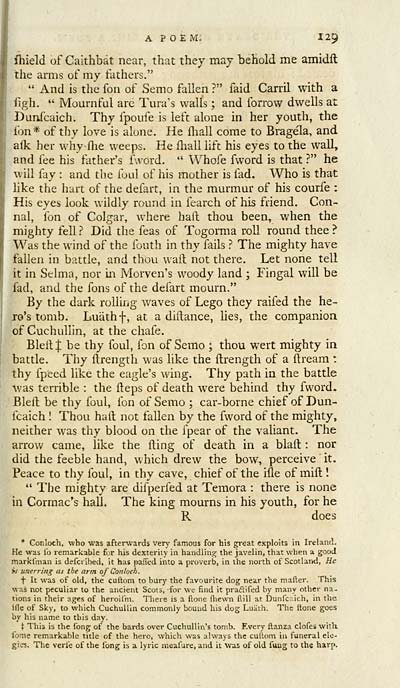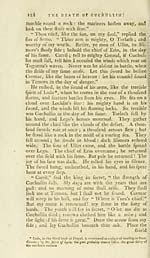Download files
Complete book:
Individual page:
Thumbnail gallery: Grid view | List view

A POEM. 129
fliield of Caithbat near, that they may behold me amidft
the arms of my fathers."
" And is the fon of Semo fallen ?" faid Carril with a
iigh. ♦' Mournful are Tura's walls ; and forrow dwells at
Dunfcaich. Thy fpoufe is left alone in her youth, the
fon* of thy love is alone. He fliall come to Bragela, and
alk her why flie weeps. He fliall lift his eyes to the wall,
and fee his father's fword. " Whofe fword is that ?" he
will fay : and the foul of his mother is fad. Who is that
like the hart of the defart, in the murmur of his courfe :
His eyes look wildly round in fearch of his friend. Con-
nal, fon of Colgar, where haft thou been, when the
mighty fell ? Did the feas of Togorma roll round thee ?
Was the wind of the fouth in thy fails ? The mighty have
fallen in battle, and thou waft not there. Let none tell
it in Sclma, nor in Morven's woody land ; Fingal will be
fad, and the fons of the defart mourn."
By the dark rolling waves of Lego they raifed the he-
ro's tomb. Luathf, at a diftance, lies, the companion
of CuchuUin, at the chafe.
Bleft:}: be thy foul, fon of Semo ; thou wert mighty in
battle. Thy ftrength was like the ftrength of a ft ream !
thy fpeed like the eagle's wing. Thy path in the battle
Was terrible : the fteps of death were behind thy fword.
Bleft be thy foul, fon of Semo ; car-borne chief of Dun-
fcaich I Thou haft not fallen by the fword of the mighty,
neither was thy blood on the fpear of the valiant. The
arrow came, like the fting of death in a blaft : nor
did the feeble hand, which drew the bow, perceive it.
Peace to thy foul, in thy cave, chief of the ille of mift I
" The mighty are difperfed at Temora : there is none
in Cormac's hall. The king mourns in his youth, for he
R does
* Conloch, who was afterwards very famous for his great exploits in Ireland.
He was lb remarkable for his dexterity in handlin.a; the javelin, that when a good
markiman is defciibed, it has pafTed into a proverb, in the north of Scotland, He
»/ unerriiig as the arm of Conloch.
t It was of old, the cuftom to bury the favourite dog near the mafter. This
was not peculiar to the ancient Scots, for we find it pradlifed by many other na-
tions in their ages of heroilm. There is a ftone (hewn ilill at Dunfcaich, in the
ifle of Sky, to which CuchuUin commonly bound his dog Luath. The itone goes
by his name to this day.
\ This is the fong of the bards over Cuchullin's tomb. Every ftanza clofes with,
fome remarkable title of the hero, which was always the cullom in funeral ele-
gies. The verfe of the fong is a lyric mealure, and it Was of old fung to the harp.
fliield of Caithbat near, that they may behold me amidft
the arms of my fathers."
" And is the fon of Semo fallen ?" faid Carril with a
iigh. ♦' Mournful are Tura's walls ; and forrow dwells at
Dunfcaich. Thy fpoufe is left alone in her youth, the
fon* of thy love is alone. He fliall come to Bragela, and
alk her why flie weeps. He fliall lift his eyes to the wall,
and fee his father's fword. " Whofe fword is that ?" he
will fay : and the foul of his mother is fad. Who is that
like the hart of the defart, in the murmur of his courfe :
His eyes look wildly round in fearch of his friend. Con-
nal, fon of Colgar, where haft thou been, when the
mighty fell ? Did the feas of Togorma roll round thee ?
Was the wind of the fouth in thy fails ? The mighty have
fallen in battle, and thou waft not there. Let none tell
it in Sclma, nor in Morven's woody land ; Fingal will be
fad, and the fons of the defart mourn."
By the dark rolling waves of Lego they raifed the he-
ro's tomb. Luathf, at a diftance, lies, the companion
of CuchuUin, at the chafe.
Bleft:}: be thy foul, fon of Semo ; thou wert mighty in
battle. Thy ftrength was like the ftrength of a ft ream !
thy fpeed like the eagle's wing. Thy path in the battle
Was terrible : the fteps of death were behind thy fword.
Bleft be thy foul, fon of Semo ; car-borne chief of Dun-
fcaich I Thou haft not fallen by the fword of the mighty,
neither was thy blood on the fpear of the valiant. The
arrow came, like the fting of death in a blaft : nor
did the feeble hand, which drew the bow, perceive it.
Peace to thy foul, in thy cave, chief of the ille of mift I
" The mighty are difperfed at Temora : there is none
in Cormac's hall. The king mourns in his youth, for he
R does
* Conloch, who was afterwards very famous for his great exploits in Ireland.
He was lb remarkable for his dexterity in handlin.a; the javelin, that when a good
markiman is defciibed, it has pafTed into a proverb, in the north of Scotland, He
»/ unerriiig as the arm of Conloch.
t It was of old, the cuftom to bury the favourite dog near the mafter. This
was not peculiar to the ancient Scots, for we find it pradlifed by many other na-
tions in their ages of heroilm. There is a ftone (hewn ilill at Dunfcaich, in the
ifle of Sky, to which CuchuUin commonly bound his dog Luath. The itone goes
by his name to this day.
\ This is the fong of the bards over Cuchullin's tomb. Every ftanza clofes with,
fome remarkable title of the hero, which was always the cullom in funeral ele-
gies. The verfe of the fong is a lyric mealure, and it Was of old fung to the harp.
Set display mode to: Large image | Transcription
Images and transcriptions on this page, including medium image downloads, may be used under the Creative Commons Attribution 4.0 International Licence unless otherwise stated. ![]()
| Early Gaelic Book Collections > Ossian Collection > Poems of Ossian, the son of Fingal > (143) |
|---|
| Permanent URL | https://digital.nls.uk/77584349 |
|---|
| Description | Selected books from the Ossian Collection of 327 volumes, originally assembled by J. Norman Methven of Perth. Different editions and translations of James MacPherson's epic poem 'Ossian', some with a map of the 'Kingdom of Connor'. Also secondary material relating to Ossianic poetry and the Ossian controversy. |
|---|
| Description | Selected items from five 'Special and Named Printed Collections'. Includes books in Gaelic and other Celtic languages, works about the Gaels, their languages, literature, culture and history. |
|---|

